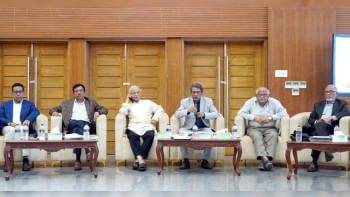Online foreign card transactions face roadblock
International credit cardholders will face trouble in settling online transactions abroad as they will have to take prior approval from banks for every cross-boundary payment.
The central bank asked commercial banks on November 14 to take online transaction authorisation form (OTAF) from clients for every foreign payment in order to tackle illegitimate online transaction.
This has forced the Bangladesh Association of Software and Information Services (BASIS), the national trade body for software and IT-enabled service industry, to sit with the central bank today to withdraw the notice.
“I know no country in the world that follows this rule. This will bring huge woes to clients in settling their cross-boundary payments,” said Syed Almas Kabir, president of BASIS.
The Association of Bankers, Bangladesh (ABB), the forum of private commercial banks, will also take preparations to sit with the central bank on this matter as this is highly tough for clients to submit OTAF for every transaction, said its Chairman Syed Mahbubur Rahman.
“For instance, many clients have to make a number of foreign transactions per day. And they will have to send OTAF for every transaction.”
This will create a difficult situation for banks as well, he said.
“It is quite tough job for banks to verify every OTAF round the clock,” said Rahman, also the managing director of Dhaka Bank.
Clients will not be able to settle their transactions immediately if they do not get approval from lenders rightaway, he said.
As per the central bank’s circular, international credit cardholders will have to submit OTAF to banks concerned, mentioning their name, card number, beneficiary name, amount of foreign currency and details of products and services to be purchased.
The banks will then activate the respective card if their reasons are satisfactory.
After completion of the transaction, the foreign payment option will be deactivated again.
The central bank in its notice asked banks to strengthen monitoring on international payment through cards to bar illegal transaction for playing online casino and gambling, forex trading, purchase of financial instruments issued in foreign stock markets, cryptocurrency and lottery ticket.
The central bank has recently found allegation that some people made illegal transactions by way of their cards. “So, the new method has been introduced to tackle illegitimate transactions. And banks will have to follow the rule strictly,” said a central bank official.
He argued that banks would not face any problem if they install artificial intelligence-based software with the system in order to verify OTAF.
But such software is yet to be introduced by any local bank in the country, said an official of the central bank who has strong knowledge on the matter. There is no need to install such software as merchant code for products or service stated by the central bank could be used to tackle the illegitimate online transaction, he added.
Syed Mohammad Kamal, country manager of MasterCard Bangladesh, echoed the same, saying online payment would become difficult if the latest circular is implemented.
Bangladesh has around 15 lakh international cards, which are very low compared to the size of population and number of banks.

 For all latest news, follow The Daily Star's Google News channel.
For all latest news, follow The Daily Star's Google News channel. 



Comments